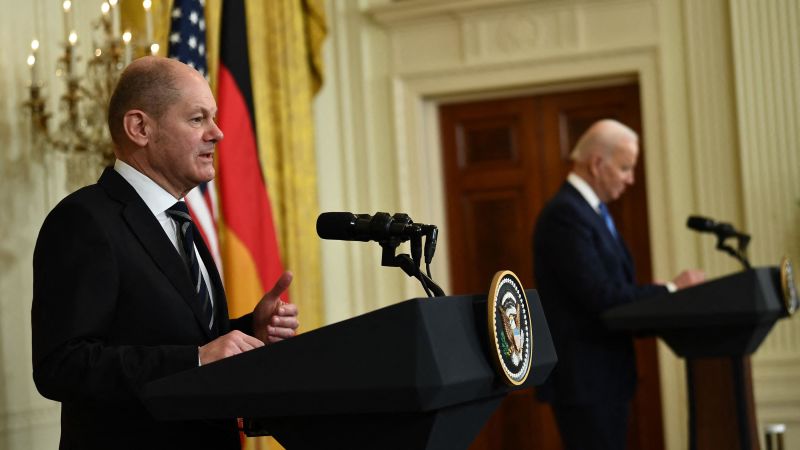Related video: US and Germany ready to impose sanctions on Russia 4:38
(CNN) --
A year ago, when German Chancellor Olaf Scholz last visited Washington, Russian forces had not yet crossed the border into Ukraine and skepticism abounded over dire warnings from the White House that an invasion was a possibility. imminent.
Now, Scholz returns this Friday to meet US President Joe Biden after a transformative 12 months that required Europe to drastically rethink its own security and Germany to undergo its most significant shift in military and energy policy in decades.
Russia's invasion of Ukraine turned Scholz, who took office two months before the Russian invasion, into a crisis leader, overseeing Europe's largest economy and most powerful democracy during the worst moment of violence on the continent since the Second World War.
Germany to send Leopard 2 tanks to Ukraine, reports Der Spiegel
What does the shipment of Leopard 2 tanks to Ukraine entail?
1:28
And it has propelled him and Biden into one of the most important relationships in the world, buoyed by shared opposition to Russia's invasion but tense at times over how to respond.
White House officials say that over the past year, Biden has developed a strong relationship with Scholz, who succeeded Chancellor Angela Merkel in late 2021. The two spoke by phone three times in January alone and during Friday's session. in the White House they are expected to speak at length in the Oval Office.
advertising
The overwhelming topic of discussion will be Ukraine, according to senior administration officials, including talks the two leaders recently had with Ukraine's President Volodymyr Zelensky, who is pressing the West for more powerful weapons as he prepares for a spring counteroffensive against Russia.
“The overall purpose of this meeting is an opportunity for the two leaders to coordinate specifically on Ukraine,” a senior administration official said before the visit.
They could also refer to recent intelligence suggesting China is considering providing Russia with lethal aid, a move US officials fear could prolong the conflict, though China will not be a "leading focus" of the talks.
The White House also plans to announce another round of military assistance for Ukraine on Friday, according to National Security Council Strategic Communications Coordinator John Kirby.
The new package will "mainly" include ammunition for weapon systems that the Ukrainians already have.
ANALYSIS |
How Russia misunderstood Germany's growing influence
The dangerous work of Ukrainian soldiers in minefields 2:38
Germany's support for Ukraine
With Scholz's arrival in the White House again, Biden hopes to strengthen a leader who has endured a difficult first year in office.
A year ago, it would have been hard to imagine Germany supplying Ukraine with weapons like howitzers, Stinger missile launchers and Leopard tanks to fend off Russian invaders.
A largely pacifist outlook had dominated Berlin's foreign policy in the decades following the German violence in World War II.
But now, Germany is once again investing in its military and shipping ever more advanced weaponry, though not at the rate Zelensky would like.
Other critics say Scholz has failed to fill a unifying role in Europe similar to Merkel's, preferring to operate unilaterally rather than in conjunction with other leaders such as France's Emmanuel Macron.
And some US officials say Germany remains too cautious compared to other Western allies.
Still, the so-called "Zeitenwende," or turning point, that Scholz called for in the days after Russia's invasion has been welcomed at the White House and reinforced by many of the steps he has taken in the months since.
Germany's decision in January to provide Ukraine with Leopard tanks is the latest example of the country overcoming its postwar hesitancy for foreign military intervention.
The decision only came after a diplomatic row with the United States, which agreed to provide Ukraine with its own Abrams tanks, despite warnings from the Pentagon that they would not be as useful on the battlefield.
There remains some controversy as to how, exactly, the deal came about.
After Biden's national security adviser, Jake Sullivan, said last weekend that "the Germans told the president that they would not be prepared to send those Leopard (tanks) into the fight... until the president also agreed to send to Abrams”, the German government insisted that the decision to send tanks came with a joint agreement and without demands from Berlin.
Opinion |
The other nuclear threat that might have been missed in Putin's speech a year after the invasion of Ukraine
Either way, the outcome has been viewed positively by Biden's advisers, some of whom were skeptical of Scholz a year ago when he seemed reluctant to apply sanctions on Russia should it invade Ukraine or shut down the Nord Stream 2 gas pipeline. Scholz took both steps once the invasion began, despite the risk that Germany would be cut off from one of its main energy suppliers.
For his part, Scholz could take advantage of Friday's meeting to bring up with Biden his ongoing discussions with other European leaders about providing security guarantees for Ukraine as a way to begin the process of negotiating the end of the war.
Now, fears are growing among American and European officials that the grueling conflict could turn into a bloody stalemate, with each side earning only small gains and refusing to come to the negotiating table.
Speaking before the German parliament before leaving for Washington, Scholz said Thursday that Germany and its Western allies were in talks with Kyiv about future security guarantees in preparation for a sustainable peace for Ukraine.
“Such security guarantees, however, come with the presumption that Ukraine will successfully defend itself in this war,” Scholz said, emphasizing that Germany would continue to support Ukraine with arms supplies.
Scholz went on to say that Russian President Vladimir Putin was not currently open to negotiations to end the war in Ukraine.
“Is Putin even ready…to negotiate a just peace?
Nothing suggests it at this point," Scholz said.
Joe Biden













